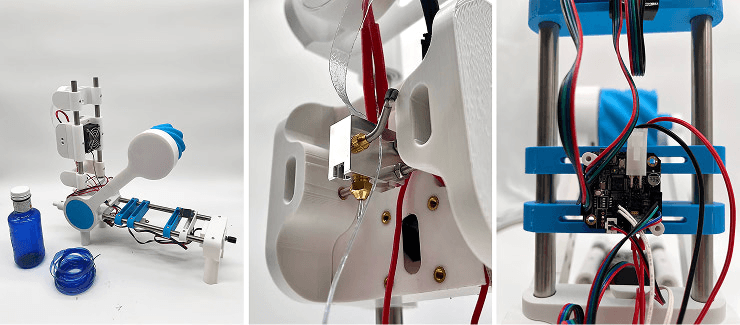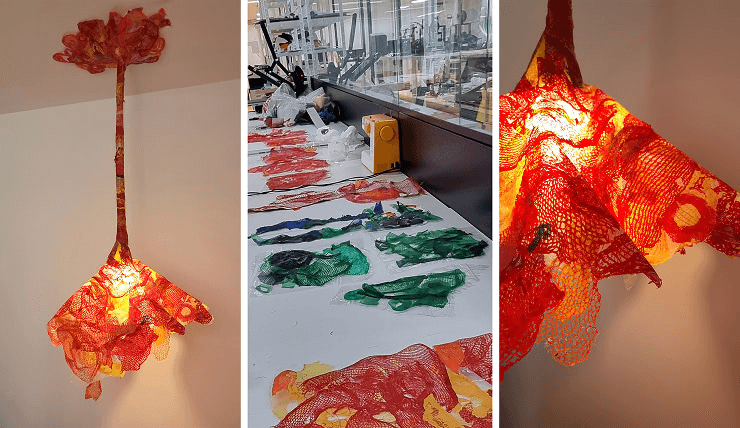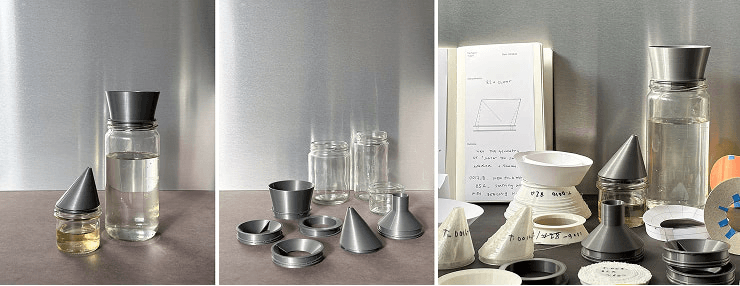Fab Lab Incubator showcases material innovation, sustainability and creative reuse

Students and faculty developed projects that repurpose waste into valuable resources through design and technology.
The Fab Lab Incubator provides students, professors, and staff with the opportunity to develop projects that tackle social and environmental challenges through design and technology. The initiative, running throughout the entire academic year, leverages the cutting-edge facilities of the Fab Labs at the Segovia campus and IE Tower, contributing a creative and collaborative culture.
"The Fab Lab Incubator is an open door to creativity and innovation, and an extraordinary opportunity for all those who wish to leave a positive mark on the world", said Maria Elena Cardiel, Associate Director for Fabrication and Facilities at IE University.
"The Fab Lab Incubator offers the IE community a unique platform to explore and bring to life ideas that challenge convention."
Maria Elena Cardiel, Associate Director for Fabrication and Facilities at IE University
The first edition of the Fab Lab Incubator, between January 2024 and December 2024, saw the development of three projects, each addressing sustainability and material reuse through innovative design methodologies.
ReBottle, by Kayla Vinh, Isabel Peña, and Olivia Zanolari (IE University Bachelor in Design students) recognize plastic bottles as one of the most frequently discarded items on campus, aims to raise awareness of plastic consumption, and give plastic bottles a second life by converting them into 3D printer filament. Using the Polyformer machine, the team developed a system to cut, melt, and extrude PET plastic bottles into usable 3D printing filament, promoting a circular economy within the university. Over the last year they built a performer machine, using extruder technology and 3D printed parts, that will be available at the Madrid Fab Lab, allowing students to create their own sustainable materials for prototyping and design.
The students valued their experience in the Fab Lab Incubator, emphasizing its role in encouraging experimentation, problem-solving, and meaningful collaboration.
"The Fab Lab Incubator was a great way to explore a passion project and pushed us to create something meaningful" said Kayla Vinh, who appreciated the access to materials, essential tools and staff support.
Olivia Zanolari highlighted the hands-on experience of tackling a campus sustainability challenge and prototyping a solution. "I look forward to seeing students use the performer machine to create their own recycled 3D printing filament from PET bottles," she said.
Isabel Peña reflected on the Fab Lab Incubator as a space to bring long-standing ideas to life. "The Polyformer will be a valuable tool for IE students who want to create sustainable 3D-printed pieces", she emphasized.
Netted-Up Lamps, by Saskia Bostelmann (Design Narratives I Adjunct Professor at IE University), explores the reuse of plastic waste from common grocery store packaging (such as nets for garlic, onions, and oranges) by transforming it into jewelry and home décor. The project aims to reframe discarded materials, giving them new life as delicate yet durable body adornments and lighting pieces. Utilizing techniques such as heat pressing, Bostelmann experimented with repurposed plastics to craft lamps that play with light and shadow, enhancing interior spaces with a sustainability-driven design. These lamps will be shown in the +ke LUZ exhibition during the Madrid Design Festival 2025, alongside works by other renowned designers.
"The Fab Lab Incubator enriches the school community by supporting experimentation and collaboration between professors, staff, and students. It created continuous interaction with diverse students while we all were working together." said Saskia Bostelmann.
Elasticity in Design, by Pablo Alabau (Design Studio II Adjunct Professor at IE University) and Silvia García Sánchez (IE University Fab Lab Assistant), investigates 3D printing with elastic materials to create interchangeable utility systems. The team focused on repurposing disposable glass jars by developing flexible Thermoplastic Polyurethane (TPU)-based seals and attachments that extend their usability. Through extensive material testing, they successfully designed and 3D-printed four functional decanters, demonstrating the potential of TPU in everyday applications. The project highlights the intersection of design, engineering, and sustainability by proposing innovative material solutions for commonly discarded items.
"I feel fortunate to have used the FabLab's resources for this research and to have received the valuable support of its staff. Discussions about the challenges and potential of the projects sparked insightful conversations and opportunities for mutual learning", said Pablo Alabau.
The IE University Fab Lab is a learning environment that allows students to make and test their projects using digital fabrication technology, alongside traditional woodworking tools, ceramics, and casting. IE University’s Fab Lab is also an official member of the global Fab Lab Network, providing access to an expansive network of students, academics, scientists, and researchers across over 90 countries. Learn more from the Fab Lab Managers.


